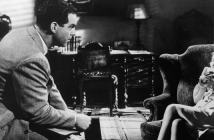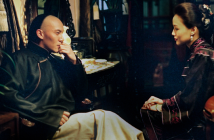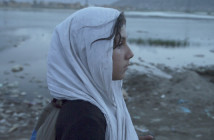Editor’s Notes: The following interview is part of our coverage of the 2015 Berlin International Film Festival. For more information on the festival visit http://www.berlinale.de and follow Berlinale on Twitter at@berlinale.
Montréal, spring 1966. In a province undergoing profound change, Jean Corbo, an idealistic 16-year-old with a Québécois mother and a father of Italian descent, is torn between two identities. Befriended by Julie and François, two young left-wing activists, he joins a clandestine group determined to use violence to trigger a socialist revolution in the province. This group is the Front de libération du Québec (FLQ).
Next Projection critic Corina Rottger sat down with Mathieu Denis at the Berlin International FIlm Festival to discuss his latest film, Corbo.
Next Projection: Corbo is a period film based on historical events in Québec in 1966 and Jean Corbo, the main character, was an actual member of the FLQ movement. How did you find out about his story and what interested you in making this film?
Mathieu Denis: My father told me about this story originally. Jean would be roughly his age if he were still alive today, so my father is from his generation. When the events happened, it kind of shocked my father and moved him to some extent because he was so close in age to Jean Corbo and it stayed with him. A long time ago he told me about this 16 year old teenager who joined the ranks of a terrorist organization and I was curious about it. I really come from a generation of cynicism that is not politicized at all and at some point, when I noticed that, I remembered Jean’s story and I tried to put myself in his shoes. When he was 16 years old, what had brought him to do that? He had gone to such extremes to have his political ideas move forward and I was trying to see whether I would have done something like that at his age. The answer to that was “No” because there were no causes that have been worth such a serious commitment and fighting. It kind of confronted me and I wanted to understand him and the era in which he had grown up in. The more I researched the more I thought it was interesting and the more I learned about it, the more I thought there is a film to be made here and so I did it.
NP: What did your research process look like? How did you get all the necessary information on Jean Corbo and his family?
MD: The research was a bit difficult at first. Jean’s story has kind of been forgotten and has become this historical footnote that we don’t really talk about anymore. When you take the history of the FLQ, there are many things that have been said or written about a later period, around 1970, which is a period we call the October Crisis, but not about its history and Jean Corbo. I knew that after Jean’s death pretty much all of the members of the organization were arrested and there were trials that lasted for five years between 1966 and 1971. I thought there had to be a lot of information on these trials. I went to the archives of the Justice House and to my great dismay they burn their archives every thirty years and there was nothing on these trials left anymore. The ironic thing in Québec is that our motto is “Je me souviens” (I remember) but the fact is that we really don’t remember. Anyway, since I didn’t have access to that I went back to the National Archives where they have archives of all the newspapers. Thankfully we haven’t burned those yet. I went through literally five years of Montreal newspapers in order to find press reports on the story. This allowed me to find a lot of information and it really gave me this overall sense of the era. Once I had that, I met members of Jean’s family and members of the FLQ, who were open enough to talk about it. It was important that it was not just one source of information. No one had exactly the same version and especially the members of the FLQ would not necessarily tell me the whole story. I could grasp parcels of information here and there. It was a lot of back and forth to get a sense of the whole story. The challenge after that is to try to find a way to make a two-hour film so you really have to find your own point of view.
NP: The film deals with Québec’s identity struggle. What’s interesting is that Jean Corbo had his own personal identity struggle since he was of French-Canadian and Italian heritage. How did that motivate him to get involved in the fight for Québec’s identity?
MD: To me Jean’s identity struggle is an essential part of the puzzle to some extent. I didn’t want to tell a historical anecdote. You can be revisiting the past but it is interesting if it is something that relates to today’s world. When I learned that his father was an Italian immigrant and his mother a French-Canadian, there is something to me that mirrors the identity crisis that Québec is going through right now. In the case of Jean, when he was in the Italian community, he was not fitting in because he was half French-Canadian. His family spoke French at home and he couldn’t speak very well Italian and was therefore not part of the Italian group. But when he was with the French-Canadians he wasn’t fitting in either. It was a time in Québec history when society was a little bit racist and being even half Italian was not necessarily a good thing for him. To me, torn between these identities, especially when you are a teenager trying to find out who you are and become your own individual, added complexity of not exactly knowing what nationality you are. I think this played a role in Jean’s eagerness to not necessarily choose sides but at some point to say, well this is who I am. He was trying to be part of a wider identity. Jean wanted to find out who he was and it was also important to him that he was not joining the dominant class, he wanted to be part of a group that was underprivileged and that was worth fighting for. That’s why it was important to him to join the FLQ, not only because of their national fight but also because of their socialist ideas and their idea of turning the society into a just society.
NP: The term “decolonization” is often used by the FLQ in the film. Can you explain the importance of this term in relation to Québec in 1966?
MD: The members of FLQ considered themselves as still being colonized by the British. During that time they saw that all over the world the colonies were freeing themselves. They were very much inspired by Algeria, Cuba and Vietnam and a number of movements in Africa for example. The common threat they saw between all these struggles was that people were taking up arms and the local people were not waiting for the colonial power to hand them over the power. They decided to take it. We hear some of these thoughts in the film by a guy named Franz Fanon. He came up with the theory of decolonization which was basically saying if you don’t decolonize yourself through violence and with force, you are staying a slave of the colony even if you are free.
NP: Since Québec started out as a French colony, I found the issue and importance of Quebec’s decolonization quite interesting with the roles being reversed.
MD: You’re hitting a very deep and profound paradox of Québec history that we have not untangled completely yet. Normally, Québec should have freed themselves from the French colony and ironically they were freed from them by another colonizing empire. The British gave them some freedom by taking it away at the same time. This makes it very strange. Québec is one of the few colonies that never got to affirm its own existence.
NP: After two referendums in Québec about its independence in 1980 and 1995 when people voted against it, how does Corbo relate to Québec today?
MD: From my perspective this is a period where we don’t know who we are anymore. After having said “no” to the idea of being a nation twice, I guess the people should have said we should embrace our Canadian identity but the people have not done that at all. They still consider themselves different from the rest of Canada and they are. It is still a very separate world, we call Québec and the rest of Canada the two solitudes. The problem with that is that the French-Canadians don’t consider themselves Canadians but they don’t consider themselves Québécois either – so what are we? There is this profound identity crisis and I think Jean’s struggle with his own identity mirrors today’s Québec.
NP: In Berlin, Corbo played in the Generation section. Was it meant to be a film for young audiences?
MD: It was not meant to be a film for young audiences but the main characters are very young. Jean Corbo and his closest friends were 16 and the leader of the FLQ movement was 26. That’s what struck me as well, I was shocked at how young they were. The film was not made with the idea to talk to a younger audience but once we had the invitation for Generation it made sense. Ideologically and politically things have changed so much and to confront some teenagers to these teenagers of 1966 who were so politicized and committed was interesting. Of course when you think about the story, the fact that Jean Corbo died the way he did can in no way be seen as positive, it is just a tragedy. But this one aspect of the story that’s inspiring is the fact that these people were convinced they could change the world we live in for the better.




